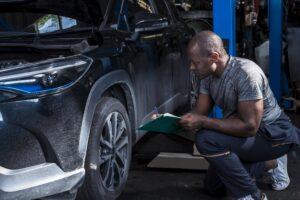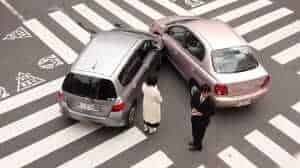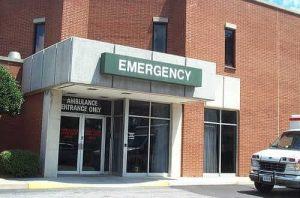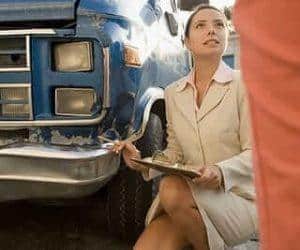
A mechanic or repair shop may be held liable for an auto accident under some circumstances. If their repairs or maintenance led to a crash, they might be the at-fault party. They may have liability insurance to cover these costs.
These cases are often difficult to prove and navigate. Working with a car accident attorney to build the case against the repair shop could make recovering the money necessary to pay for your care and other expenses easier. Most personal injury firms provide free case consultations so you can discuss your legal options after a crash.
When Is a Mechanic or Repair Shop Liable for an Auto Accident?
Most traffic accidents occur because of a driver’s error behind the wheel. One driver makes a mistake, and it leads to a crash. Occasionally, though, there is more to the story. Sometimes a defective part or issue with the vehicle itself causes a collision.
The car owner is often still the first person victims look to for fault. The owner has a responsibility to provide maintenance and repairs to their vehicle when necessary. When they fail to, and the problem causes a crash, they can be held responsible for the collision.
However, what if they trusted someone else with the maintenance and repair before the crash? Situations when a mechanic or repair shop might be liable for an accident include:
- When they acted carelessly or recklessly in making a repair
- When they did not do the work promised
- When they did the work improperly
- When they took shortcuts that led to another problem with the vehicle
- Other situations when their work caused a crash
Documenting the cause of these accidents and determining whether negligence occurred could require industry experts, extensive investigation, and other efforts. Sometimes, a vehicle or parts manufacturer or another party could be liable, too.
For a free legal consultation, call 800-537-8185
Understanding Who Is Liable for Injuries and Damages in a Crash
When a state has fault-based auto insurance laws, these cases require the victim to show negligence occurred. Negligence is carelessness or recklessness that leads to a crash and injuries. Proving negligence involves demonstrating that:
- The accused party owed the victim a certain duty of care, such as repairing their vehicle properly
- They failed to do so, breaching their duty
- This failure was the proximate cause of the crash
- The victim suffered physical, emotional, and financial damages
For example, imagine a vehicle needing new brakes. The owner took the car to the mechanic, who charged them for the repairs but did not change the brake pads and rotors. The driver soon caused a rear-end accident because they could not stop in time. This driver, and the victim they hit, might have a case against the mechanic and their employer.
Options for Seeking Compensation in Car Accident Cases
Most successful car accident cases settle without needing to go to trial. The victim and their attorney could negotiate a fair payout with the at-fault party’s insurance company and receive a check for the agreed-upon amount. While this could take time, it is usually much faster than taking a case to a jury trial and fighting for fair compensation there.
However, victims can also pursue compensation by filing a lawsuit. This requires navigating the legal process in your local civil court. Cases often still settle during this time. Those that do not may go to trial before the judge or jury, who will decide the case.
If you need to sue, there are deadlines you must meet. These statutes of limitations vary widely, usually between one and three years. Meeting the deadline is essential for recovering fair compensation in your case.
Even in states with a three-year statute of limitations, building a case as soon as possible is important. This allows your attorney to gather more evidence and document the negligence more easily. Plus, you do not want to wait three years or more to recover the money you need to pay your bills if you can avoid it.
Click to contact our personal injury lawyers today
Recoverable Damages in a Poor Maintenance or Repairs Crash
By holding a mechanic or garage liable for a car accident, victims can seek and secure compensation for a range of economic and non-economic damages. These are the expenses and losses they incurred because of the crash.
If you believe a mechanic or repair shop’s work caused your crash, your attorney can help you build a case and document your recoverable damages. This requires gathering bills, proof of income, receipts, and other paperwork, hiring experts to estimate future care costs, and using knowledge of the industry and similar cases to calculate non-economic damages.
Some common recoverable damages in an auto accident case include:
- Medical treatment and care to date
- Future treatment or ongoing care and support costs
- Current and future income lost from time missed at work
- Diminished earning capacity for lasting injuries that prevent a return to work
- Property damages, such as repair or replacement of your car
- Pain and suffering and other non-economic damages
- Wrongful death damages if the victim died from their injuries
Discuss Your Auto Accident Case With a Lawyer for Free
You can speak with a Morris Bart law firm attorney for free. We provide complimentary case assessments during your initial consultation with one of our auto accident lawyers. Our team has 15 offices to serve clients hurt in crashes in Louisiana, Mississippi, Alabama, and Arkansas.
Don’t wait to get started on your case. We’re ready to help you seek justice from a mechanic or repair shop or any other liable parties. Contact us over the phone today to get started. We know how to prove that another party’s negligence caused your crash.
Questions?Call 800-537-8185
to find a Morris Bart office near you.





